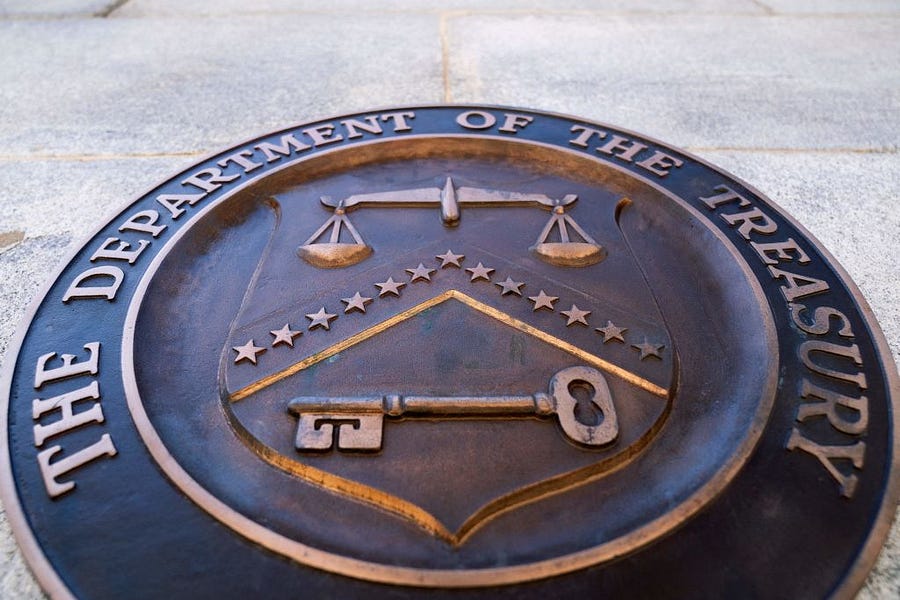In the earliest days of fighting in Ukraine, the United States and its European partners moved with uncharacteristic speed and unity to inflict economic pain on the conflict’s aggressor, Russia. But as Moscow looks for new buyers and foreign investors to repair the damage that Western economic sanctions inflicted, the U.S. is looking to ensure that Russia’s culpable businesses, industries, officials, and oligarchs remain economically isolated.
One tool at the Biden administration’s disposal to do so is secondary sanctions, which, in theory, could deter other countries and corporations from cultivating financial ties with Russia by threatening them with various penalties. So how does the U.S. wield sanctions to punish not only the transgressor in question, but also foreign entities helping to cushion their economic blow?
Since the United States’ renewed deployment of sanctions in the 20th century, various American administrations have sought to bar militant or illegal behavior by threatening to sever the culprit from American markets and financial systems. Historically these measures have gone after bad actors by preventing U.S.-based corporations, government arms, and individuals from engaging through travel and trade. Americans and American institutions that fail to comply can face hefty fines and even prison time.
Primary sanctions often prove effective because of the dominance of the U.S. dollar worldwide, which requires a large volume of transactions to pass through financial institutions under U.S. jurisdiction.
But some loopholes remain. Under these types of sanctions, other countries and financial institutions can help the sanctioned party gain access to American markets by moving around currencies or dealing in in-kind trade. Intermediary countries can also eliminate the sanctioned party’s need to access some U.S. markets altogether—thereby offsetting primary sanctions’ consequences—by offering to become alternative buyers and sellers for the sanctioned party.
So, in recent years, the U.S. has increasingly made use of secondary sanctions, which strengthen existing penalties by targeting third parties dealing with embargoed governments, corporations, and individuals. For example, if an individual participates in commerce with a blacklisted member of the Islamic Revolutionary Guard Corps, the Treasury Department’s Office of Foreign Assets Control can then impose penalties like travel bans and asset forfeitures targeting the individual. In extreme instances, the go-between may also find itself entirely disconnected from the U.S. dollar and U.S. financial institutions.
“If you were to impose secondary sanctions on the Central Bank of Russia, on Sberbank, on Gazprombank, on entire sectors of Russia’s economy—its entire financial sector, its energy sector, etc.—you would force all those foreign banks and foreign companies around the world to a choice of putting themselves at risk of U.S. sanctions and being cut off from the U.S. financial system and the U.S. market, or complying with U.S. sanctions and cutting off Russia, its banks, and companies,” Richard Goldberg, a senior adviser at the Foundation for Defense of Democracies and National Security Council official under the Trump administration, told The Dispatch.
Former President Donald Trump leveraged such a threat as part of its “maximum pressure” sanctions on Iran following the administration’s 2018 withdrawal from the Obama-era Iran nuclear deal, effectively pulling Europe into a multinational effort to cripple the Iranian economy by sanctioning various sectors of its economy. When European allies created a workaround company (known as a special-purpose vehicle) to continue business with Iran outside of the U.S. dollar and American financial systems, Trump effectively shuttered the body by threatening secondary sanctions.
And former President Barack Obama used a similar tactic to prevent foreign countries from recognizing the Russian-backed “people’s republic” in eastern Ukraine or Russian jurisdiction over Crimea.
Secondary sanctions are “currency agnostic,” Goldberg explained, meaning they can punish and prevent commerce even if it’s not conducted in the U.S. dollar: “We are looking at a transaction however that transaction is conducted. Whether it is a cash transaction, whether it is a swap, whether it is a barter, whether it’s in euros, in dollars, in yuan, in rupees or any other currency on Earth—it’s the activity that is sanctionable and then that bank involved, that company involved, faces the consequence of a cut off from the U.S. financial system and the U.S. market. And that deters the activity.”
But because secondary sanctions target trade that doesn’t involve the U.S. directly, they have generated international controversy. While the U.S. defends the measures as necessary enforcement mechanisms for primary sanctions, other countries denounce them—and unilateral sanctions more broadly—as extraterritorial economic coercion.
Some analysts caution that this divisiveness could work against U.S. trade interests. “The more frequently you impose secondary sanctions, the more you make clear that this is unilateral power being exercised, and no one really likes having that kind of power exercised against them, so the more you create incentives to find workarounds,” said Ben Coates, a professor at Wake Forest whose work centers on the history of economic sanctions. “Outside of Europe, most countries have not been willing to follow the sanctions or to impose sanctions of their own [on Russia], so I think that’s an indicator of their desire to have freedom to chart their own path.”
In the case of China in particular, a likely financial lifeline for Russia, it might be difficult for the Biden administration to rally support for sweeping secondary sanctions from the Group of Seven (G7)—an international coalition of major economic players—given the volume of commerce going through China. Some experts worry that President Joe Biden’s warnings that Chinese military and financial support for Russia’s war could severely jeopardize its trade relationship with the U.S. and Europe might ring hollow without the international consensus to back it up.
But a targeted approach could prove more viable. The Trump administration’s 2019 export restrictions on Chinese telecom giant Huawei demonstrated that no entity is too big to sanction, particularly if it uses American or European technology. The Biden team last month threatened Chinese microchip makers with a similar step, signaling that it would shut off their access to advanced U.S. software should they supply Russia with semiconductors, a crucial component used in various technologies.
What triggers secondary sanctions—and their scope—is up to the U.S., which is one of the reasons they’ve proven effective in the past. According to Coates, the ambiguity creates a “chilling effect.”
“There’s that threat of winding up on the list, and that can lead companies to avoid deals that might technically be legal, but there’s concern that you don’t assign a contract that gets too close to the line,” Coates said. “The vagueness of secondary sanctions is in some sense part of the larger power of the sanctioning apparatus.”







Please note that we at The Dispatch hold ourselves, our work, and our commenters to a higher standard than other places on the internet. We welcome comments that foster genuine debate or discussion—including comments critical of us or our work—but responses that include ad hominem attacks on fellow Dispatch members or are intended to stoke fear and anger may be moderated.
With your membership, you only have the ability to comment on The Morning Dispatch articles. Consider upgrading to join the conversation everywhere.